Martin Brodeur
| Martin Brodeur | |
|---|---|
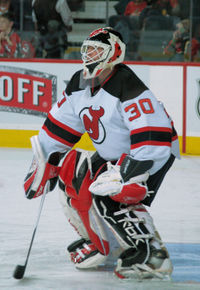 Martin Brodeur warms up prior to a 2007 game at the Pengrowth Saddledome. |
|
| Born | May 6, 1972 , Montreal, Quebec, Canada |
| Height Weight |
6 ft 2 in (1.88 m) 210 lb (95 kg; 14 st 0 lb) |
| Position | Goaltender |
| Catches | Left |
| NHL team | New Jersey Devils |
| Ntl. team | |
| NHL Draft | 20th overall, 1990 New Jersey Devils |
| Playing career | 1991–present |
| Website | www.martinbrodeur30.com |
Martin Pierre Brodeur (French pronunciation: [maʁtɛ̃ bʁɔdœʁ]; born May 6, 1972) is a Canadian ice hockey goaltender from Montreal, Quebec, who has played his entire National Hockey League (NHL) career with the New Jersey Devils. In his 19-year tenure with the Devils, he has led the team to three Stanley Cup championships and has taken them to the playoffs every year but one. Brodeur has won two Olympic gold medals with Team Canada in the 2002 and 2010 Winter Olympic Games, as well as several other medals with the team in other international competitions.
Brodeur is the NHL's all-time leader in regular season wins, shutouts, and games played, and holds numerous other league and franchise records.[1] Brodeur won at least 35 games in every season between 1996–97 and 2007–08, and is the only goalie in NHL history with eight 40-win seasons.[2] He is a four-time Vezina Trophy winner, a five-time Jennings Trophy winner, a ten-time NHL All-Star, a Calder Memorial Trophy winner, and one of only two NHL goaltenders to have scored goals in both the regular season and the playoffs.[3][4]
Brodeur uses a hybrid style of goaltending by standing up more than butterfly style goalies.[5][6] He is known for his puck handling, his positional play, and his reflexes, especially with his glove hand.[6] Brodeur's prowess in puck handling directly led the NHL to change its rules regarding when goalies were allowed the handle the puck outside of the goal crease.[7]
Contents |
Early life
Brodeur's success followed his father Denis, who was considered an outstanding goaltender.[8] He played in the 1956 Olympics for Team Canada and won a bronze medal.[9] After his playing career was over, Denis was a longtime photographer for the Montreal Canadiens. For more than 20 years, he attended all Montreal games and practices, and when Martin was old enough he came along. Martin idolized their goaltender Patrick Roy.[10]
However, Martin did not start out as a goalie himself, but rather as a forward. His goaltending career began when his coach asked him if he wanted to play as a backup at the position in a youth tournament. Martin explained:[11]
| “ | The next season my coach came up to me and said, 'Do you want to be a goalie or forward this year?' It was the biggest decision of my life, and I was seven years old. I don't know why I decided, but I thought it would be fun to play goal. | ” |
Brodeur's play in goal soon got him noticed by fans and scouts.[12] In 1990, he made it to the Quebec Major Junior League. While playing with the Saint-Hyacinthe Laser, Brodeur made the QMJHL All-Rookie team and the QMJHL 2nd All-Star Team in 1992.
Brodeur was drafted by the New Jersey Devils in the first round (20th overall) in the 1990 NHL Entry Draft.
NHL career
1991–1995
In the 1991–92 NHL season, he was called up to the Devils on an emergency basis for four games when Devils' goaltenders Chris Terreri and Craig Billington became injured. Brodeur won his NHL debut against the Boston Bruins, 4–2,[13] and played in one playoff game that season. He spent most of the season and the entire following season with the Utica Devils of the AHL. However, in the 1993–94 season, Brodeur gained recognition when he won the Calder Trophy, an annual award for the best rookie in the NHL, after leading the Devils to the second best record in the league and the Eastern Conference Finals in the playoffs, where they lost to the New York Rangers in seven games.[14] He finished 2nd in goals against average and 4th in save percentage during the regular season, helping him eventually land the starting job over Terreri.
The next season, which was shortened to forty-eight games due to a four month lockout that was focused on salary cap issues, the Devils finished tied for 9th overall, 5th in their conference, and were not considered a Stanley Cup contender. However, with the leadership of Brodeur, they defeated the Boston Bruins in the 1st round after shutting them out in three of their four wins. Brodeur had another stellar performance in the second round against Pittsburgh, where he gave up only eight goals and helped the Devils soundly defeat the Penguins in five games. In the third round the Devils defeated Philadelphia in six games, giving them their first Stanley Cup finals appearance in franchise history, opposite the heavily favoured Detroit Red Wings. But the strong play of Brodeur and the Devils' infamous "trap" method would make this series lopsided in favour of New Jersey, who would go on to sweep the Red Wings while holding them to only seven goals in four games. Brodeur now had a Stanley Cup in only his second full season in the NHL. After the victory, he was quoted as saying the following:[4]
| “ | In the last game against Detroit, the time from ten minutes left to one minute left was probably the longest nine minutes of my life. But from one to zero was probably the greatest time I've ever had. I didn't want the clock to run out. It was such a great feeling: people crying in the stands, people jumping up and down, people cheering. Guys couldn't even sit up on the bench. It was probably the best minute of my life. | ” |
1995–1999
After a year of success, the Devils were in the middle of the pack for most of the 1995–96 season and barely missed the playoffs. Brodeur played in 74 (of a possible 82) games, setting a single-season record for most minutes played by a goalie, while having the 2nd most shutouts in the league. He was named the starter in the All-Star game for the Eastern Conference, and stopped all 12 shots he faced.[4] He finished fourth in voting for the Vezina Trophy, which is awarded to the league's top goaltender. Brodeur also played on Team Canada during the 1996 World Cup of Hockey, where Canada lost to the United States in the gold medal match.
In the 1996–97 season, the Devils finished 3rd in the NHL and played the Montreal Canadiens in the first round of the playoffs. In the first game of the series on April 17, 1997, with the Devils up by two goals late in the game, Brodeur fired the puck the length of the ice and into the Canadiens' empty net to ensure a 5–2 victory. It was only the second time in NHL history that a goaltender had scored in the playoffs, and the fifth time overall.[15] The Devils went on to win that series, but lost in the second round to the rival New York Rangers. Brodeur was runner-up for the Vezina, was named to his second all-star team, and had the lowest goals-against-average by a goalie in almost thirty years, earning him the Jennings Trophy. He also had 10 shutouts and a .927 save-percentage.
The following year, Brodeur had 43 wins and 10 shutouts in the regular–season. The Devils finished first in the Eastern Conference,[16] but lost in the first round of the playoffs to the eighth-seeded Ottawa Senators.[17] Once again, Brodeur made the All-Star Team, finished as a runner up for the Vezina, and took home the Jennings Trophy.[18]
In the 1998–99 season, the Devils finished first in the Eastern Conference for the third straight year, with Brodeur winning 39 games. He was among the contenders for the Vezina Trophy and started in the All-Star game, making his fourth appearance. However, the Devils lost in the first round to the Pittsburgh Penguins. It was by far the worst playoff performance in Brodeur's 5-year career, as he allowed 20 goals in 7 games with an .856 save percentage.[19]
1999–2004
During the 1999–2000 season, on February 15, 2000, Brodeur was credited with his second career goal, as Brodeur was the last Devils player on the ice to touch the puck before Daymond Langkow of the Philadelphia Flyers accidentally put the puck into his own empty net during a delayed penalty call against the Devils.[20] Brodeur had previously tapped the puck behind his net, stopping an attempted wrap-around by a Philadelphia Flyer.
That season, Brodeur won 43 games for the second time in his career, and the Devils finished with the fourth spot in the Eastern Conference after losing the division to the Philadelphia Flyers by two points.[21] Brodeur helped the Devils sweep the Florida Panthers in the first round, giving up only six goals in four games. In the next round against the Toronto Maple Leafs he recorded two shutouts, including one in the final game of the series as the Devils went on to win four games to two, setting up a showdown with rival Philadelphia in the Eastern Conference Finals. The Flyers took a commanding 3–1 series lead and had home ice to close out the series, but Brodeur gave up only one goal in each of the remaining three games of the series, propelling the Devils to the surprising come from behind series victory in 7 games. They went on to play the Dallas Stars in the Stanley Cup Finals, who had a higher seed but fewer regular season points, giving the Devils home ice advantage in the series. After taking game one with a 7-goal rally against Dallas, the Devils were led by Brodeur the rest of the way as he gave up only six goals in the next five games, giving the team their second Stanley Cup Championship in six years.[22]
The next year, Brodeur topped the 40-win mark for the third time in his career, despite having an average GAA and save-percentage throughout the season. He played in the All-Star Game for the 6th consecutive season, and helped the Devils earn the top seed in the Eastern Conference. In the first round Brodeur recorded two shutouts against the Carolina Hurricanes and the Devils took the series in six games. After struggling to beat 7th-seeded Toronto in seven games, the Devils had little trouble defeating the 6th-seeded Penguins in the Eastern Conference Finals, where Brodeur added two more shutouts, both on the road. In their second straight Stanley Cup finals appearance, the Devils played a back-and-forth series against the top seeded Colorado Avalanche. Despite a 3–2 series lead and a game at Continental Airlines Arena to close out the series, two consecutive losses lead to a Colorado Stanley Cup victory in seven games.[23][24]
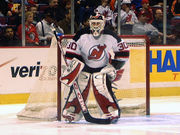
In the 2001–02 season, Brodeur finished among the league leaders in wins and GAA. Brodeur continued to lead the league in victories and remained a Vezina and MVP candidate. The next season, in 2002–03, Brodeur finally achieved what had been eluding him his whole career: the Vezina Trophy.[25] He also won the Jennings Trophy again, was a Hart Memorial Trophy finalist for the league's Most Valuable Player, and was named a 1st Team All-Star and started in the All-Star Game. With one of the most impressive playoff performances of his career, Brodeur guided the Devils to their third Stanley Cup victory after dramatic seven-game series wins against the top-seeded Ottawa Senators and the surprising 7th-seeded Mighty Ducks of Anaheim. He posted 3 shutouts against Anaheim and had a playoff total of 7 overall,[26] breaking Dominik Hašek's NHL record of 6 (Hasek had recorded his 6 shutouts for Detroit the previous year).[27] Despite this, the Conn Smythe Trophy for playoff MVP was awarded to Anaheim goaltender Jean-Sébastien Giguère, who became the first player not on the championship team to be named playoff MVP since Ron Hextall of Philadelphia in 1987.[28] Some hockey writers speculated a New Jersey player did not win because there were multiple candidates, resulting in a split vote among the sportswriters who selected the winner.[29][30] In the 2003–04 season, Brodeur won his second consecutive Vezina Trophy and Jennings trophy. He was also a first Team All-Star, a starter in the NHL All-Star Game, and a finalist for the Hart Trophy again. The Devils lost the Atlantic Division title by 1 point to the Philadelphia Flyers, who had obtained the 3-seed and home ice advantage against the sixth seeded Devils in the first round of the playoffs. This would be too much for Brodeur and the Devils to overcome, as the Flyers went on to defeat them in five games.
The Brodeur Rule
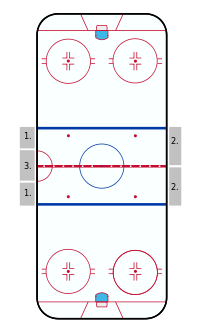
After the 2004–05 lockout and before the start of the 2005–06 season, the league instituted a new rule preventing goaltenders from playing the puck behind the goal line, except within a trapezoid-shaped zone located behind the net. The trapezoid begins at the goal line with angled lines six feet from each goal post and widens to 28 feet at the end boards.[31] See image at right. Former Flyers general manager Bobby Clarke was one of the leaders in getting the trapezoid implemented. This was viewed by many as singling out Brodeur, who was one of the best at getting behind the net to handle the puck, and has come to be known as the "Brodeur Rule".[7][32]
At the 2009 NHL General Managers' Meeting it was discussed whether the rule should be eliminated as a solution to the increasing number of injuries on defensemen who are being hit hard by forechecking forwards. The forecheckers were no longer impeded by defensemen holding them up because of the crackdown on interference which created situations where defensemen were being hit at high speeds. Brodeur believed that revoking the trapezoid could result in more scoring and more exciting games. He explained, "If you give the liberty to the goalies to play the puck, they’ll mess up more than they’re successful." He also expressed his concern for defensemen, "It’s a no-brainer if they want to start to eliminate these huge hits for the defensemen... Whenever my defensemen or somebody was getting a big hit, I felt guilty that I let that guy get hit like that. Now, I’ve got to sit and watch all the time... You’ve got to try to find something because so many guys are getting hurt." At the time of his statement, Devils defensemen Paul Martin, Johnny Oduya and Bryce Salvador were all out with injuries. Devils coach Jacques Lemaire supported removing the trapezoid and commented that, “They never put a rule against Wayne Gretzky because he was so great… To me, it’s good and it’s a gamble that having the goaltender come out, and it’s – hey, you’ve got to play smart against them.”[33]
Ultimately the suggestion was rejected and the rule stayed in place. Toronto Maple Leafs GM Brian Burke said, “We had originally approved a rule where the goaltenders couldn’t handle the puck behind the net at all. The game was turning into a tennis match. You’d dump it in and the goalie would throw it out and now with the soft chip into the corner it turns into a puck battle and a forecheck opportunity, which is what we wanted.”[34]
2005–2009
After the 2004–05 NHL lockout canceled the 2004–05 season, Brodeur signed a contract extension with the Devils on January 27, 2006, that will pay him $31.2 million over six years. In the 2005–06 season he posted 43 wins, adding on to his NHL records of what was now five 40-win seasons and ten consecutive 30-win seasons.[35] After struggling early in the season, his impressive play later on made him a finalist for the Vezina Trophy for the third straight year,[36] and helped lead the Devils to a surprising comeback in the last two months of the season that resulted in them winning the Atlantic Division in the final game of the year.[37] In the first round of the playoffs, he beat the Rangers for the first time in his career, leading the Devils to a four-game sweep. But a 4–1 series loss to the Carolina Hurricanes eliminated the Devils in the next round.
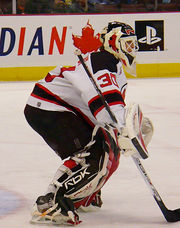
In the 2006–07 season, Brodeur made his ninth NHL All-Star Game appearance in Dallas, Texas, won his third Vezina Trophy and rose on several NHL records lists. On December 9, 2006, he posted a 2–0 victory over the Philadelphia Flyers for his 462nd career win, moving him into 2nd place on the all-time list ahead of active goalie Ed Belfour of the Florida Panthers.[38] Just a few weeks later, on December 26, Brodeur beat the Pittsburgh Penguins 3–0 to record his 85th career shutout, moving him past Glenn Hall for 3rd place on that all-time list and 1st place among all active goalies.[39] On February 1, 2007, Brodeur beat the Philadelphia Flyers 6–5 in overtime to take the all-time lead in overtime (non-shootout) wins with 45, passing childhood idol Patrick Roy.[40] The Devils first 38 wins of the season were all with Brodeur in net, leading him to set a NHL record for most consecutive wins for a team.[41]
On April 3, 2007, Brodeur tied the NHL record for most wins in a single season with 47, set by Bernie Parent in 1973–74, in a 2–1 shootout victory against the Ottawa Senators.[42] Two days later, he broke the record with his 48th win in a 3–2 victory over the Philadelphia Flyers, which helped the Devils clinch their seventh Atlantic Division title and the second seed in the Eastern Conference.
In the Eastern Conference Quarterfinals against the seventh-seeded Tampa Bay Lightning, Brodeur started out shaky and the Devils fell behind two games to one. He would come back strong, however, to finish the series, and helped the team advance in six games while passing Grant Fuhr for second place in all-time playoff victories. In the second round against the Ottawa Senators, Brodeur could not continue his stellar play and allowed 15 goals in only 5 games en route to a 4–1 series victory for the Senators.
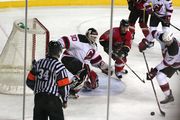
In the 2007–08 season, Brodeur became the second goalie in NHL history to reach 500 wins with a victory against the Philadelphia Flyers on November 17, 2007. The only other goalie to achieve the feat is Patrick Roy. Brodeur was also named the starting goalie for the Eastern Conference in the 2007–08 NHL All Star Game in Atlanta. However, he was unable to participate because of a family obligation. New York Islanders goalie Rick DiPietro took over as starter of the game, while Boston Bruins goalie Tim Thomas took the last spot for goalies.
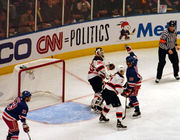
After losing a bitter series against the rival New York Rangers in the opening round of the 2008 NHL playoffs, Brodeur refused to shake Sean Avery's hand. During game three of the series, in an unusual move, Avery turned to face Brodeur during a 5-on-3 power play, and began waving his hands and stick in front of Brodeur's face in an effort to distract him. The day after this game the NHL announced that it had revised its unsportsmanlike conduct rule, now known as The Sean Avery Rule, effectively outlawing such antics.[43]
Brodeur started wearing a new painted mask design for the 2008–09 NHL season with a stylized "MB30" on the front, replacing the "J" that had been on his mask for his entire NHL career. During a game on November 1, 2008, Brodeur suffered a "bruised elbow" which would later be diagnosed as a torn distal biceps tendon, the first major injury in his career. Following surgery on November 6, he would miss 16 weeks of the season before playing his next game on February 26, 2009. Upon returning from the injury, Brodeur registered a 4–0 shutout against the Colorado Avalanche for his 99th career shutout.[44] Three days later, he recorded his 100th career shutout against the Philadelphia Flyers, three short of Terry Sawchuk's NHL record.
2009–present
In 2009, Brodeur broke and tied a number of career records for goaltenders, including:
- Most career wins, breaking Patrick Roy's record of 551.[45][46]
- Most playoff shutouts, tying Patrick Roy's record of 23.
- Most minutes played, breaking Patrick Roy's record of 60,235 minutes.
- Most games played, surpassing Patrick Roy's record of 1029.[47]
- Most regular-season shutouts, breaking Terry Sawchuk's record of 103.
On December 30, 2009, Brodeur and the Devils shut out the Pittsburgh Penguins, 2–0. It was his 105th career shutout, giving him the all-time professional record, surpassing George Hainsworth's total of 104 combined in the NHL (94) and Western Canada Hockey League (10). On April 6, 2010 Brodeur reached his 600th career win by defeating the Thrashers 3-0. This was also his 110th career shutout.
In the 2009–10 NHL season, Brodeur won the NHL statistics in wins (45), shutouts (9), games played (77) and minutes played (4499). He also won his fifth William Jennings Trophy and had the third best GAA in the league, leading his team to back-to-back division wins that included a 6-0 regular season sweep of the defending Stanley Cup Champion Pittsburgh Penguins. However, the Devils lost in the first round of the playoffs, losing to the 7th seeded team Philadelphia Flyers in 5 games.
International play
| Medal record | ||
|---|---|---|
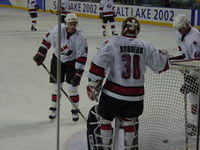 Brodeur warming up at the 2002 Winter Olympics in Salt Lake City. |
||
| Men's ice hockey | ||
| Competitor for |
||
| Olympic Games | ||
| Gold | 2002 Salt Lake City | Ice hockey |
| Gold | 2010 Vancouver | Ice hockey |
| World Championships | ||
| Silver | 1996 Austria | Ice hockey |
| Silver | 2005 Austria | Ice hockey |
Brodeur was selected as Team Canada's back-up goalie to Patrick Roy for the 1998 Winter Olympics in Nagano, Japan; but did not get to play. Canada failed to win a medal after losing the bronze-medal match to Finland, a game in which many people thought Brodeur should have played.[48]
In the 2002 Olympics at Salt Lake City, Utah, Brodeur was initially named the backup behind Curtis Joseph, but following Joseph's losing the tournament opener against Sweden, Brodeur was named the starting goaltender the rest of the way, and won gold for Canada. He had the best GAA in the tournament and went undefeated, stopping 31 of 33 shots in the gold-medal victory over Team USA.
Brodeur then led Team Canada to a World Cup of Hockey championship in 2004, allowing only 5 goals in five games. He led all goalies in GAA and save percentage while going undefeated. He had another impressive performance for the team at the world hockey championships in the following year. After this, The Sports Forecaster 2005–06 said the following:[4]
| “ | Brodeur is arguably the top goaltender in the world. Fresh off a World Cup win in 2004 and another strong performance at the 2005 IIHF World hockey championships. He's the game's best puck-handling goaltender, though the NHL's new rules changes may somewhat alter that effectiveness. | ” |
Brodeur was selected as Team Canada's starter in the 2006 Winter Olympics in Turin, Italy. He started in 4 of 6 games, but Canada failed to win a medal after losing to Russia in the quarterfinals.
He was one of the three goalies on Team Canada for the 2010 Winter Olympics in Vancouver, Canada. He registered a shootout win against Switzerland and a loss to the United States. After the loss to the US, he was benched for the remainder of the 2010 Games in favor of Roberto Luongo.
Brodeur has played for Canada in:
- 1996 IIHF World Championships (silver)
- 1996 World Cup of Hockey (Lost final.)
- 1998 Winter Olympic Games (4th place)
- 2002 Winter Olympic Games (gold)
- 2004 World Cup of Hockey (champion)
- 2005 IIHF World Championships (silver)
- 2006 Winter Olympics (Lost quarterfinal.)
- 2010 Winter Olympics (gold)
Personal life
Martin and Melanie Dubois (a native of Saint-Liboire, Quebec, Canada) married in 1995 and have four children:[49] Anthony, born in 1995; twin sons, William and Jeremy, born in 1996; and Annabelle Antoinette, born in 2002. Melanie filed for divorce during the 2003 playoffs amid reports that Martin was having an affair with Genevieve Nault, the wife of Melanie's brother.[50] The incident added some fuel to the fire for hecklers during the playoffs.[51] The reports proved to be true, as Martin and Genevieve got married in June 2008.[52] Their first child together, Maxime Phillipe Brodeur, was born in November 2009.[53]
Brodeur is regarded as a brilliant chef and an engaging raconteur in his spare time.[8] He has hosted a street hockey tournament in his hometown of St. Leonard, Quebec, for each of the Devils' Stanley Cup championships, where he plays his childhood position of forward. His oldest brother, Denis Jr., is a photographer like their father, and his other older brother, Claude, was a pitcher in the Montreal Expos' farm system. He has two sisters, Line and Sylvie.
In 2005, Brodeur began co-authoring his autobiography, Brodeur: Beyond the Crease, with long-time Toronto Star columnist and ESPN contributor Damien Cox, which was released in October 2006. Some of the things Brodeur talks about in the book are player salaries and contracts, NHL marketing, Lou Lamoriello, and the Devils' new arena in Newark, the Prudential Center. Brodeur also includes his views on the "new NHL" after the lockout, and how it affects his career.[54] The book's photographs were shot by Martin's father, Denis.
Brodeur co-owns a business called "La Pizzeria Etc." with former teammate Sheldon Souray. The idea came about after Souray was traded to play in Montreal, the city in which the business now operates.[55] Brodeur is a co-owner of the Spa d'Howard, also based in his native Quebec.
Brodeur resides in West Orange, New Jersey, near the Devils former practice facility, South Mountain Arena. He became a naturalized United States citizen on December 1, 2009, giving him dual citizenship: Canada and the United States.[56]
Career statistics
Bolded numbers indicate league leader.
Regular season
Statistics are through the 2009–10 season.
| Season | Team | League | GP | W | L | T | OTL | MIN | GA | SO | GAA | SV% |
|---|---|---|---|---|---|---|---|---|---|---|---|---|
| 1989–90 | Saint-Hyacinthe Laser | QMJHL | 42 | 23 | 133 | 2 | — | 2333 | 156 | 0 | 4.01 | — |
| 1990–91 | Saint-Hyacinthe Laser | QMJHL | 52 | 22 | 24 | 4 | — | 2946 | 162 | 2 | 3.30 | — |
| 1991–92 | Saint-Hyacinthe Laser | QMJHL | 48 | 27 | 16 | 4 | — | 2846 | 161 | 2 | 3.39 | — |
| 1991–92 | New Jersey Devils | NHL | 4 | 2 | 1 | 0 | — | 179 | 10 | 0 | 3.35 | .882 |
| 1992–93 | Utica Devils | AHL | 32 | 14 | 13 | 5 | — | 1952 | 131 | 0 | 4.03 | .884 |
| 1993–94 | New Jersey Devils | NHL | 47 | 27 | 11 | 8 | — | 2625 | 105 | 3 | 2.40 | .915 |
| 1994–95 | New Jersey Devils | NHL | 40 | 19 | 11 | 6 | — | 2184 | 89 | 3 | 2.05 | .902 |
| 1995–96 | New Jersey Devils | NHL | 77 | 34 | 30 | 12 | — | 4434 | 173 | 6 | 2.14 | .911 |
| 1996–97 | New Jersey Devils | NHL | 67 | 37 | 14 | 13 | — | 3838 | 120 | 10 | 1.88 | .927 |
| 1997–98 | New Jersey Devils | NHL | 70 | 43 | 17 | 8 | — | 4128 | 130 | 10 | 1.89 | .917 |
| 1998–99 | New Jersey Devils | NHL | 70 | 39 | 21 | 10 | — | 4239 | 162 | 4 | 1.79 | .906 |
| 1999–00 | New Jersey Devils | NHL | 72 | 43 | 20 | 8 | — | 4312 | 161 | 6 | 2.04 | .910 |
| 2000–01 | New Jersey Devils | NHL | 72 | 42 | 17 | 11 | — | 4297 | 166 | 9 | 2.32 | .906 |
| 2001–02 | New Jersey Devils | NHL | 73 | 38 | 26 | 9 | — | 4347 | 156 | 4 | 2.15 | .906 |
| 2002–03 | New Jersey Devils | NHL | 73 | 41 | 23 | 9 | — | 4374 | 147 | 9 | 2.02 | .914 |
| 2003–04 | New Jersey Devils | NHL | 75 | 38 | 26 | 11 | — | 4554 | 154 | 11 | 2.03 | .917 |
| 2004–05 | DNP — Lockout | — | — | — | — | — | — | — | — | — | — | — |
| 2005–06 | New Jersey Devils | NHL | 73 | 43 | 23 | — | 7 | 4364 | 187 | 5 | 2.57 | .911 |
| 2006–07 | New Jersey Devils | NHL | 78 | 48 | 23 | — | 7 | 4697 | 171 | 12 | 2.18 | .922 |
| 2007–08 | New Jersey Devils | NHL | 77 | 44 | 27 | — | 6 | 4635 | 168 | 4 | 2.17 | .920 |
| 2008–09 | New Jersey Devils | NHL | 31 | 19 | 9 | — | 3 | 1814 | 73 | 5 | 2.41 | .916 |
| 2009–10 | New Jersey Devils | NHL | 77 | 45 | 25 | — | 6 | 4499 | 168 | 9 | 2.24 | .916 |
| NHL totals | 1076 | 602 | 324 | 105 | 29 | 63,520 | 2,340 | 110 | 2.21 | .914 | ||
| AHL totals | 32 | 14 | 13 | 5 | — | 1952 | 131 | 0 | 4.03 | .884 | ||
| QMJHL totals | 142 | 72 | 53 | — | — | 8125 | 479 | 4 | 3.54 | — | ||
Playoffs
| Season | Team | League | GP | W | L | MIN | GA | SO | GAA | SV% |
|---|---|---|---|---|---|---|---|---|---|---|
| 1989–90 | Saint-Hyacinthe Laser | QMJHL | 12 | 5 | 7 | 678 | 46 | 0 | 4.07 | — |
| 1990–91 | Saint-Hyacinthe Laser | QMJHL | 4 | 0 | 4 | 232 | 16 | 0 | 4.14 | — |
| 1991–92 | Saint-Hyacinthe Laser | QMJHL | 5 | 2 | 3 | 317 | 14 | 0 | 2.65 | — |
| 1991–92 | New Jersey Devils | NHL | 1 | 0 | 1 | 32 | 3 | 0 | 5.62 | .800 |
| 1992–93 | Utica Devils | AHL | 4 | 1 | 3 | 258 | 18 | 0 | 4.18 | — |
| 1993–94 | New Jersey Devils | NHL | 17 | 8 | 9 | 1171 | 38 | 1 | 1.95 | .928 |
| 1994–95 | New Jersey Devils | NHL | 20 | 16 | 4 | 1222 | 34 | 3 | 1.67 | .927 |
| 1996–97 | New Jersey Devils | NHL | 10 | 5 | 5 | 659 | 19 | 2 | 1.73 | .929 |
| 1997–98 | New Jersey Devils | NHL | 6 | 2 | 4 | 366 | 12 | 0 | 1.97 | .927 |
| 1998–99 | New Jersey Devils | NHL | 7 | 3 | 4 | 425 | 20 | 0 | 2.83 | .856 |
| 1999–00 | New Jersey Devils | NHL | 23 | 16 | 7 | 1450 | 39 | 2 | 1.61 | .927 |
| 2000–01 | New Jersey Devils | NHL | 25 | 15 | 10 | 1505 | 52 | 4 | 2.07 | .897 |
| 2001–02 | New Jersey Devils | NHL | 6 | 2 | 4 | 381 | 9 | 1 | 1.42 | .938 |
| 2002–03 | New Jersey Devils | NHL | 24 | 16 | 8 | 1491 | 41 | 7 | 1.65 | .934 |
| 2003–04 | New Jersey Devils | NHL | 5 | 1 | 4 | 298 | 13 | 0 | 2.62 | .902 |
| 2005–06 | New Jersey Devils | NHL | 9 | 5 | 4 | 473 | 17 | 1 | 2.25 | .923 |
| 2006–07 | New Jersey Devils | NHL | 11 | 5 | 6 | 688 | 28 | 1 | 2.44 | .916 |
| 2007–08 | New Jersey Devils | NHL | 5 | 1 | 4 | 300 | 16 | 0 | 3.19 | .891 |
| 2008–09 | New Jersey Devils | NHL | 7 | 3 | 4 | 427 | 17 | 1 | 2.39 | .929 |
| 2009–10 | New Jersey Devils | NHL | 5 | 1 | 4 | 299 | 15 | 0 | 3.01 | .881 |
| NHL totals | 181 | 99 | 82 | 11,246 | 376 | 23 | 2.01 | .919 | ||
| AHL totals | 4 | 1 | 3 | 258 | 18 | 0 | 4.18 | — | ||
| QMJHL totals | 21 | 7 | 14 | 1227 | 76 | 0 | 3.71 | — | ||
International
Bolded numbers indicate tournament leader.
| Year | Team | Event | GP | W | L | T | MIN | GA | SO | GAA | |
|---|---|---|---|---|---|---|---|---|---|---|---|
| 1996 | Canada | WC | 3 | 0 | 1 | 1 | 140 | 8 | 0 | 3.43 | |
| 1996 | Canada | WCH | 2 | 0 | 1 | 0 | 60 | 4 | 0 | 4.00 | |
| 1998 | Canada | Oly | 0 | 0 | 0 | 0 | 0 | 0 | 0 | — | |
| 2002 | Canada | Oly | 5 | 4 | 0 | 1 | 300 | 9 | 0 | 1.80 | |
| 2004 | Canada | WCH | 5 | 5 | 0 | 0 | 300 | 5 | 1 | 1.00 | |
| 2005 | Canada | WC | 7 | 5 | 2 | 0 | 419 | 20 | 0 | 2.87 | |
| 2006 | Canada | Oly | 4 | 2 | 2 | 0 | 238 | 8 | 0 | 2.01 | |
| 2010 | Canada | Oly | 2 | 1 | 1 | 0 | 124 | 6 | 0 | 2.90 | |
| Senior int'l totals | 29 | 17 | 7 | 2 | 1601 | 60 | 1 | 2.25 | |||
Legacy
Milestones
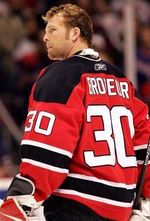
Brodeur is the youngest goaltender in NHL history to reach the 300, 400 and 500 regular season win plateaus, and is the only goaltender to reach 600 regular season wins (Brodeur currently stands at 602 wins). His 300th victory came on December 15, 2001, with a 39-save shutout against the Ottawa Senators at the Corel Centre. His 400th victory was on March 23, 2004, at the Office Depot Center in Sunrise, Florida, as the Devils defeated the hometown Florida Panthers. Brodeur stopped twenty-one shots, and needed to work overtime to get the win. With the victory he also became the first goaltender to win 400 games playing every game for the same team.[4] Brodeur reached the 500 win plateau on November 17, 2007, against the Philadelphia Flyers, with a 6 to 2 win. On March 15, 2008, he earned his seventh 40-win season of his career, the most of any goaltender in NHL history. On April 6, 2010, Brodeur reached 600 wins with a 3-0 shutout over the Atlanta Thrashers.
On March 14, 2009, Brodeur recorded his 551st career win against the Montreal Canadiens at the Bell Centre to tie Patrick Roy for the most in NHL history in his hometown and where Roy played the first half of his career. To acknowledge their fellow countryman, the crowd of Canadiens fans chanted Brodeur's name at the end of the game and gave him a standing ovation. Brodeur's father Denis was at the game taking pictures.[57] Three nights later, in a 3–2 win over the Chicago Blackhawks, Brodeur became the all-time NHL leader in regular season wins by a goaltender with 552.
On November 27, 2009, Brodeur broke the record for most minutes ever played by an NHL goaltender, breaking Patrick Roy's record of 60,235.[58]
On December 7, 2009, Brodeur tied Sawchuk's record for regular season shutouts at 103 in a 3–0 victory over the Buffalo Sabres. Twelve nights later, Brodeur broke the record set by Patrick Roy for games played by a goaltender in the National Hockey League (1,030 games). Two weeks after tying Sawchuk's shutout record, Brodeur recorded his 104th regular season shutout, breaking Sawchuk's record with a 4–0 victory over the Pittsburgh Penguins, stopping all 35 shots. On December 30, 2009, Brodeur and the Devils again shut out the Pittsburgh Penguins, 2–0. It was his 105th career shutout, giving him the all-time professional record, surpassing George Hainsworth's total of 104 combined in the NHL (94) and Western Canada Hockey League (10).
Records
In over 16 seasons with the New Jersey Devils, Brodeur owns several notable NHL records as listed below. Most of these records Brodeur has broken were held by goalies who have played a full 20 year career at least.
Career
Except as noted, these records include performance through the end of the 2009-10 regular season.
- Most regular season wins: 602
- Most shutouts: 110
- Most shutouts, regular season & playoffs combined: 133
- Most overtime wins: 45
- Most consecutive 30-win seasons: 12
- Most consecutive 35-win seasons: 11
- Most 40-win seasons: 8
- Youngest goalie to reach 300, 400, and 500 career wins
- Most games played by an NHL goaltender: 1076
- Most total minutes played by an NHL goaltender 63461
- Only NHL goalie to score a game-winning goal
- One of two NHL goalies (Ron Hextall) to score a goal in both the regular season and the playoffs
Regular season
- Most wins in a single season (48, in 2006–07)
- Most minutes played in a single season (4697, in 2006–07)
Playoffs
These statistics are as of the end of the 2010 NHL Playoffs.
- Most shutouts in a playoff (7, in 2002–03)
- Most shutouts in playoffs, career: (23, tied with Patrick Roy)
- Most shutouts in a Stanley Cup final (3, in 2002–03; tied with Toronto Maple Leafs' Frank McCool)
- 2nd place: 99 Wins
- 3rd goaltender to win the Stanley Cup with a Game-7 shutout in 2002–03.
- 1st goaltender in history to have 3 shutouts in two different playoff series. (1995 against Boston in the Conference Quarterfinals, 2003 against Anaheim in the Stanley Cup final.)
Brodeur has also acquired more than 30 franchise records, including most all-time, regular season and playoff wins, shutouts, games lowest goals-against-average, and is second in games played as a Devil. The only major awards he has yet to win are the Hart Trophy given to the regular season's most valuable player, and the Conn Smythe Trophy, granted annually to the most outstanding player in the postseason.
Awards
- Calder Memorial Trophy — 1994
- NHL 1st All-Star Team — 2003, 2004, 2007
- NHL 2nd All-Star Team — 1997, 1998, 2006, 2008
- NHL All-Rookie Team — 1994
- NHL All-Star Game — 1996, 1997, 1998, 1999, 2000, 2001, 2003, 2004, 2007, 2008
- Olympic Gold Medal — 2002, 2010
- Primus World'Stars Challenge Bowl — 2004
- QMJHL 2nd All-Star Team — 1992
- QMJHL All-Rookie Team — 1990
- Stanley Cup — 1995, 2000, 2003
- Vezina Trophy — 2003, 2004, 2007, 2008
- William M. Jennings Trophy — 1997 (with Mike Dunham), 1998, 2003 (tied Roman Čechmánek & Robert Esche), 2004, 2010 Tied most all time with Patrick Roy
- World Cup of Hockey Championship — 2004
See also
- New Jersey Devils notable players and award winners
- List of NHL statistical leaders
- List of goaltenders who have scored a goal in an NHL game
- List of NHL players with 1000 games played
Notes
- ↑ Rosen, Dan (2009-03-18). "Is Brodeur setting the bar beyond reach?". NHL.com. http://www.nhl.com/ice/news.htm?id=414407. Retrieved 2009-03-19.
- ↑ Morreale, Mike G. (2010-03-23). "Brodeur reaches 40 wins again as Devils rip Jackets". NHL.com. http://www.nhl.com/ice/recap.htm?id=2009021081. Retrieved 2010-03-24.
- ↑ "Martin Brodeur, Devils – Notes". NHL.com. http://www.nhl.com/ice/player.htm?id=8455710&view=notes. Retrieved 2009-03-19.
- ↑ 4.0 4.1 4.2 4.3 4.4 "Martin Brodeur Biography". hockeygoalies.org. http://www.hockeygoalies.org/bio/brodeurm.html. Retrieved 2006-12-31.
- ↑ "A standup guy – or is he?". Associated Press. FoxSports.com. 2009-03-14. http://msn.foxsports.com/nhl/story/9331992/Devils-Brodeur-closes-in-on-record-for-wins. Retrieved 2009-03-17.
- ↑ 6.0 6.1 Cox, Damien (2009-03-18). "Brodeur the best? There's no debate". ESPN.com. http://sports.espn.go.com/nhl/columns/story?columnist=cox_damien&id=3990924. Retrieved 2009-03-18.
- ↑ 7.0 7.1 Diamos, Jason. (September 16, 2005). "New Rule Will Take a Weapon Away from Brodeur". New York Times (subscription required). http://select.nytimes.com/gst/abstract.html?res=F10616F835550C758DDDA00894DD404482. Retrieved 2007-03-02.
- ↑ 8.0 8.1 "Stanley Cup Journal". HHOF.com. August 22, 2003. http://www.hhof.com/HTML/exSCJ_33.shtml. Retrieved 2006-12-01.
- ↑ Allen, Kevin (2006-01-29). "Brodeur following in father's mask". USA Today. http://www.usatoday.com/sports/olympics/torino/2006-01-29-brodeur_x.htm. Retrieved 2006-12-01.
- ↑ Wigge, Larry (2001-06-04). "Q&A – hockey players Patrick Roy and Martin Brodeur – Brief Article – Interview". Sporting Times. http://findarticles.com/p/articles/mi_m1208/is_23_225/ai_75434961. Retrieved 2007-04-27.
- ↑ "Martin Brodeur – Facts". MartinBrodeur.net. 2007. http://www.martinbrodeur.net/index.php?lng=en&vyber=fakty. Retrieved 2007-04-06.
- ↑ "Martin Brodeur". AskMen.com. 2005. http://ca.askmen.com/men/sports_60/86c_martin_brodeur.html. Retrieved 2007-04-07.
- ↑ Rosen, Dan (2009-03-12). "Brodeur was a scorer before he was a goalie". NHL.com. http://www.nhl.com/ice/news.htm?id=413372&navid=DL. Retrieved 2009-03-17.
- ↑ "1994 National Hockey League Playoffs". nbpfaus.net. 2001. http://nbpfaus.net/~pfau/nhl/1994.html. Retrieved 2007-02-09.
- ↑ "Martin Brodeur – Facts". MartinBrodeur.net. http://www.martinbrodeur.net/index.php?lng=en&vyber=fakty. Retrieved 2006-12-31.
- ↑ "1997–98 NHL Standings". hockeydb.com. 1998. http://www.hockeydb.com/ihdb/stats/leagues/seasons/nhl19271998.html. Retrieved 2007-03-03.
- ↑ "1997–98 NHL Playoff Results". hockeydb.com. 1998. http://www.hockeydb.com/ihdb/stats/playoffdisplay.php3?league=NHL1927&season=1998&leaguenm=NHL. Retrieved 2007-03-03.
- ↑ "1998 NHL Awards". hockeynut.com. 1998. http://www.hockeynut.com/9899/awards98.html. Retrieved 2007-03-03.
- ↑ "Martin Brodeur – Career statistics". NHL.com. 2007. http://www2.nhl.com/nhl/app?service=page&page=PlayerDetail&playerId=8455710&tab=crst. Retrieved 2007-03-03.
- ↑ Bostrom, Don. (February 11, 2007). "Devils' Brodeur is closing in on becoming NHL's new zero hero". mccall.com. http://www.mcall.com/sports/columnists/all-nhlcolumnsundayfeb11,0,4691572.column?page=2&coll=all-randomcolumnistssport-misc. Retrieved 2007-03-03.
- ↑ "1999-00 NHL Standings". hockeydb.com. 2000. http://hockeydb.com/ihdb/stats/leagues/seasons/nhl19272000.html. Retrieved 2007-03-20.
- ↑ "1999-00 NHL Playoffs". hockeydb.com. June 10, 2001. http://hockeydb.com/ihdb/stats/playoffdisplay.php3?league=NHL1927&season=2000&leaguenm=NHL. Retrieved 2007-03-20.
- ↑ "Game 6 recap". CNN SI. June 8, 2001. http://sportsillustrated.cnn.com/hockey/nhl/recaps/2001/06/07/njd_col. Retrieved 2007-03-20.
- ↑ Associated Press (June 10, 2001). "Devils fall one game short in repeat quest". CNN SI. http://sportsillustrated.cnn.com/hockey/nhl/2001/playoffs/news/2001/06/10/devils_folo_ap. Retrieved 2007-03-20.
- ↑ Roarke, Shawn P. (June 12, 2003). "At long last, the Vezina". NHL.com. http://www.nhl.com/hockeyu/history/trophies/brodeur_vezina061203.html. Retrieved 2007-03-03.
- ↑ "NHL Scoreboard – June 9, 2003: Anaheim Ducks at New Jersey Devils (recap)". ESPN Internet Ventures. 2003-06-09. http://scores.espn.go.com/nhl/recap?gameId=230609011. Retrieved 2007-04-17.
- ↑ Associated Press (2003). "2003 NHL playoffs – Statitudes". CNN SI. http://sportsillustrated.cnn.com/hockey/2003/playoffs/news/2003/06/10/devils_btn. Retrieved 2007-04-12.
- ↑ "Conn Smythe Trophy". NHL.com. 2007. http://www.nhl.com/trophies/smythe.html. Retrieved 2007-03-05.
- ↑ "Who will win the Conn Smythe?". CBC Sports. 2003-06-06. http://www.cbc.ca/sports/story/2003/06/06/conn_smythe030606.html. Retrieved 2006-11-28.
- ↑ Beaton, Rod (June 9, 2003). "Trophy, stats no consolation for Giguere". USA Today. http://www.usatoday.com/sports/hockey/cup/2003-06-09-giguere-smythe_x.htm. Retrieved 2006-11-28.
- ↑ "NHL Rulebook Rule 31: Goaltender Penalties". NHL.com. 2005. http://www.nhl.com/rules/rule31.html. Retrieved 2007-03-02.
- ↑ Jones, Tom. (September 18, 2005). "Brodeur not handling new rule well". St. Petersburg Times. http://www.sptimes.com/2005/09/18/Sports/Brodeur_not_handling_.shtml. Retrieved 2007-03-02.
- ↑ "Brodeur hopes NHL banishes trapezoid". Fire&Ice. 2009. http://blogs.northjersey.com/blogs/fireice/comments/brodeur_hopes_nhl_banishes_trapezoid/. Retrieved 2009-11-10.
- ↑ "NHL decides to keep trapezoid". Fire&Ice. 2009. http://blogs.northjersey.com/blogs/fireice/nhl_decides_to_keep_trapezoid/. Retrieved 2009-11-10.
- ↑ Associated Press (March 4, 2006). "Brodeur sets goaltending mark in Devils win". TSN. Archived from the original on 2007-03-10. http://web.archive.org/web/20070310131328/http://www.tsn.ca/nhl/teams/news_story/?ID=157193&hubname=nhl-devils. Retrieved 2006-12-06.
- ↑ "NHL Announces 2005–06 Trophy finalists". NHL.com. May 4, 2006. http://www.nhl.com/news/2006/05/271296.html. Retrieved 2007-03-05.
- ↑ "Devils complete comeback to capture Atlantic Division title". MSG Network. 2006. http://www.msgnetwork.com/content_news.jsp?articleID=v0000msgn20060419T023023461&newsgroup=ap.sportsml.columnist.article&sports=ice-hockey&team=Devils&league=nhl. Retrieved 2007-03-05.
- ↑ "Brodeur vaults into 2nd on all-time win list". Yahoo! Sports. 2006. http://sports.yahoo.com/nhl/news;_ylt=ApEG9C82o9RC5C8bZdGzTzpivLYF?slug=afp-ihockeynhldevils&prov=afp&type=lgns. Retrieved 2006-12-10.
- ↑ "Penguins Devils Recap – Tuesday December 26, 2006". Yahoo Sports!. 2006. http://sports.yahoo.com/nhl/recap;_ylt=AtFCxMTuQK_xMxtSoR30ZsZ7vLYF?gid=2006122611&prov=ap. Retrieved 2006-12-26.
- ↑ Kreiser, John. (February 2, 2007). "Take nothing for granted in the 'final' minute". nhl.com. http://www.nhl.com/nhl/app/?service=page&page=NewsPage&articleid=288388. Retrieved 2007-02-02.
- ↑ "Devils goalie Clemmensen gets first win in 11 months". ESPN. 2007. http://sports.espn.go.com/nhl/recap?gameId=270225023. Retrieved 2007-04-12.
- ↑ "2006–07 NHL Standings". Yahoo! Sports. 2007. http://sports.yahoo.com/nhl/standings;_ylt=Ah6GJ3htsMPCh5StqCrl7Ih7vLYF. Retrieved 2007-04-04.
- ↑ "NHL reacts quickly to Avery's antics, amends unsportsmanlike conduct rule". NHL.com. 2008. http://www.nhl.com/nhl/app?articleid=360464&page=NewsPage&service=page. Retrieved 2008-05-02.
- ↑ Associated Press (February 26, 2009). "Marty's back, as good as ever". NHL.com. http://www.nhl.com/ice/recap.htm?id=2008020909. Retrieved 2009-02-26.
- ↑ Rosen, Dan (2009-03-15). "Roy glad to be there for Brodeur's big night". NHL.com. http://www.nhl.com/ice/news.htm?id=413927. Retrieved 2009-03-19.
- ↑ "Brodeur becomes winningest goalie ever with 552nd victory". The Sports Network. 2009-03-17. http://www.tsn.ca/nhl/story/?id=271603&lid=headline&lpos=topStory_main. Retrieved 2009-03-17.
- ↑ Morreale, Mike G. (2009-12-19). "Brodeur sets another record as Devils beat Senators". NHL.com. http://www.nhl.com/ice/recap.htm?id=2009020511. Retrieved 2009-12-19.
- ↑ Canadian Press (August 18, 2005). "Backup battle heats up at Canada camp". TSN.ca. http://www.tsn.ca/story/print/?id=133888. Retrieved 2007-02-27.
- ↑ "Stanley Cup Journals:33". hhof.com. 2003. http://www.hhof.com/html/exSCJ_33.shtml. Retrieved 2007-02-28.
- ↑ "Brodeur's wife files for divorce". ESPN.com. 2003. http://sports.espn.go.com/nhl/playoffs2003/story?id=1557270. Retrieved 2007-04-12.
- ↑ "Canada's capital primed for East finals". sportingnews.com. 2003. http://archive.sportingnews.com/nhl/articles/20030510/472987.html. Retrieved 2007-04-15.
- ↑ Puck Daddy (2008-06-30). "Romantic or insane: Marty Brodeur gets married again". Yahoo! Sports. http://sports.yahoo.com/nhl/blog/puck_daddy/post/Romantic-or-insane-Marty-Brodeur-gets-married-a?urn=nhl,91034. Retrieved 2008-06-30.
- ↑ Gulitti, Tom (November 24, 2009). "Brodeur a happy father—again; Eckford and Corrente switch spots". The Record of NJ. http://blogs.northjersey.com/blogs/fireice/comments/brodeur_a_happy_father_--_again/. Retrieved 24 November 2009.
- ↑ "Brodeur: Beyond the Crease (Hardcover)". Amazon.com. 2006. http://www.amazon.com/dp/0470838515/. Retrieved 2006-12-06.
- ↑ "About Martin – La Pizzeria Etc.". MartinBrodeur30.com. 2009. http://www.martinbrodeur30.com/about_1757_en/. Retrieved 2009-02-26.
- ↑ "Devils' Martin Brodeur now a U.S. citizen". nationalpost.com. 2009. http://network.nationalpost.com/np/blogs/postedsports/archive/2009/12/01/devils-martin-brodeur-now-a-u-s-citizen.aspx. Retrieved 2009-12-02.
- ↑ Farrell, Sean (March 14, 2009). "Brodeur ties NHL record with 551st career win". Yahoo! Sports. http://sports.yahoo.com/nhl/recap?gid=2009031410. Retrieved 2009-03-16.
- ↑ "Martin Brodeur Sets Another Record in the Devils’ Victory". www.nytimes.com. 2009-11-28. http://www.nytimes.com/2009/11/28/sports/hockey/28nhl.html. Retrieved 2009-11-28.
External links
- Official website of Martin Brodeur
- Martin Brodeur's career stats at The Internet Hockey Database
- Martin Brodeur (New Jersey Devils team site)
- Brodeur's profile on the Legends of Hockey site associated with the Hockey Hall of Fame
- List of NHL victories
| Preceded by Jason Miller |
New Jersey Devils first round draft pick 1990 |
Succeeded by Scott Niedermayer |
| Preceded by Teemu Selanne |
Winner of the Calder Trophy 1994 |
Succeeded by Peter Forsberg |
| Preceded by José Théodore |
Winner of the Vezina Trophy 2003, 2004 |
Succeeded by Miikka Kiprusoff |
| Preceded by Miikka Kiprusoff |
Winner of the Vezina Trophy 2007, 2008 |
Succeeded by Tim Thomas |
| Preceded by Chris Osgood, Mike Vernon |
Winner of the Jennings Trophy 1997, 1998 (1997: Shared with Mike Dunham) |
Succeeded by Ed Belfour, Roman Turek |
| Preceded by Patrick Roy |
Winner of the Jennings Trophy 2003, 2004 (2003: Tie Roman Čechmánek/Robert Esche) |
Succeeded by Miikka Kiprusoff |
| Preceded by Tim Thomas, Manny Fernandez |
Winner of the Jennings Trophy 2010 |
Succeeded by incumbent |